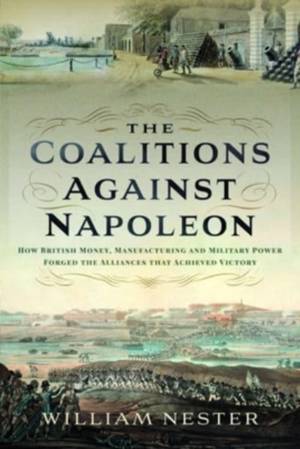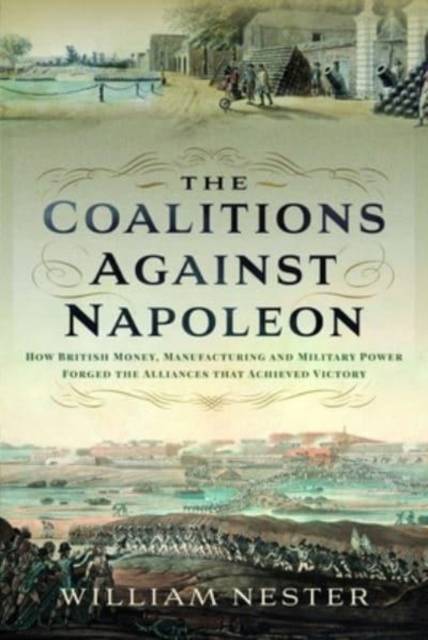
- Retrait gratuit dans votre magasin Club
- 7.000.000 titres dans notre catalogue
- Payer en toute sécurité
- Toujours un magasin près de chez vous
- Retrait gratuit dans votre magasin Club
- 7.000.0000 titres dans notre catalogue
- Payer en toute sécurité
- Toujours un magasin près de chez vous
The Coalitions Against Napoleon
How British Money, Manufacturing and Military Power Forged the Alliances That Achieved Victory
William Nester
Livre relié | Anglais
34,95 €
+ 69 points
Description
Britain alone could not hope to defeat the might of Napoleonic France which, through enforced conscription, had become a nation in arms. But British leaders had a long history of forging alliances to counter their rivals and when revolution ravaged France in 1793 and a levée en masse raised a huge patriotic army, it was through a coalition of monarchies that French ambitions were restrained - a coalition made possible by British gold and British industry.
When Napoleon seized the reins of power in France, he too introduced conscription and, once again, it was a succession of British led and funded coalitions which eventually brought Napoleon to his knees. During the years 1793 to 1815, the British Government formed and underwrote seven coalitions that cost Britain £1,657,854,518 as the national debt tripled from £290,000,000 to £860,000,00. Of that, British subsidies to around thirty allies amounted to £65,830,228, along with staggering amounts of war supplies mass produced by British factories and shipped to allies.
Britain's leading role in Europe did not end with Waterloo. Immediately following the Sixth Coalition, and amidst the Seventh Coalition, Britain constructed, with the other great powers, a security system of cooperation and consultation called the 'Concert of Europe' that prevented a serious war among them for two generations.
Britain's power to underwrite those coalitions came from a related series of revolutions - agrarian, mercantile, financial, technological, manufacturing, cultural, and political that developed over the proceeding century. For many reasons that happened in Britain and not elsewhere. Of them, cultural values may be most crucial. Constraints were fewer and incentives greater for enterprising Britons to invest, invent, buy, and sell in ways that enriched themselves and their nation more than elsewhere. During the eighteenth century, Britain's leaders mastered a virtuous power cycle of victorious wars, expanding production, captured territories and markets, and more income.
During a speech before Congress in December 1940, President Franklin D. Roosevelt called on Americans to be an 'arsenal of democracy' to aid Britain and other countries threatened by the imperialistic fascist powers. Britain played exactly the same role during the Napoleonic era. The Coalitions Against Napoleon explores how Britain developed and asserted the financial, manufacturing, and military power to achieve that goal.
When Napoleon seized the reins of power in France, he too introduced conscription and, once again, it was a succession of British led and funded coalitions which eventually brought Napoleon to his knees. During the years 1793 to 1815, the British Government formed and underwrote seven coalitions that cost Britain £1,657,854,518 as the national debt tripled from £290,000,000 to £860,000,00. Of that, British subsidies to around thirty allies amounted to £65,830,228, along with staggering amounts of war supplies mass produced by British factories and shipped to allies.
Britain's leading role in Europe did not end with Waterloo. Immediately following the Sixth Coalition, and amidst the Seventh Coalition, Britain constructed, with the other great powers, a security system of cooperation and consultation called the 'Concert of Europe' that prevented a serious war among them for two generations.
Britain's power to underwrite those coalitions came from a related series of revolutions - agrarian, mercantile, financial, technological, manufacturing, cultural, and political that developed over the proceeding century. For many reasons that happened in Britain and not elsewhere. Of them, cultural values may be most crucial. Constraints were fewer and incentives greater for enterprising Britons to invest, invent, buy, and sell in ways that enriched themselves and their nation more than elsewhere. During the eighteenth century, Britain's leaders mastered a virtuous power cycle of victorious wars, expanding production, captured territories and markets, and more income.
During a speech before Congress in December 1940, President Franklin D. Roosevelt called on Americans to be an 'arsenal of democracy' to aid Britain and other countries threatened by the imperialistic fascist powers. Britain played exactly the same role during the Napoleonic era. The Coalitions Against Napoleon explores how Britain developed and asserted the financial, manufacturing, and military power to achieve that goal.
Spécifications
Parties prenantes
- Auteur(s) :
- Editeur:
Contenu
- Nombre de pages :
- 272
- Langue:
- Anglais
Caractéristiques
- EAN:
- 9781399043021
- Date de parution :
- 30-06-23
- Format:
- Livre relié
- Format numérique:
- Genaaid
- Dimensions :
- 163 mm x 236 mm
- Poids :
- 566 g

Les avis
Nous publions uniquement les avis qui respectent les conditions requises. Consultez nos conditions pour les avis.






